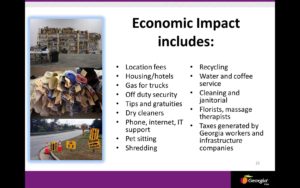AJC Business Writer Talked to GABB About News Coverage
 Matt Kempner, the AJC’s sometimes irreverent business columnist, spoke to the GABB on Aug. 30 about how the news media covers business.
Matt Kempner, the AJC’s sometimes irreverent business columnist, spoke to the GABB on Aug. 30 about how the news media covers business.
The writer described how journalists find news leads and offered advice for businesses to connect with journalists.
Matt writes a regular column called Unofficial Business in the Atlanta Journal Constitution.
Some recent columns include:
Atlanta Spending Divide Starts at the Perimeter
Atlanta Airport Launches Pricey Underground Adventure
Developers Face a Stink in DeKalb
Kempner says he enjoys finding the twists behind our adventures with business, money and careers. Prior to his latest assignment, he wrote a regular column on intriguing entrepreneurs and reported on technology and energy. His career has included serving as a business editor and public editor as well as lots of reporting gigs, from business investigations to politics, government and the environment. You can follow him on Facebook at https://www.facebook.com/mattkempnercolumnist or on Twitter: @Mattkempner
The GABB is composed of professionals who work with owners of Georgia businesses. GABB members represent owners of Georgia businesses and help them establish the sales price of their business, create marketing plans and strategies for the sale of their business, identify and qualify potential buyers, and work to protect the confidentiality of the entire process. Many of today’s business buyers are individuals who have decided not to re-enter corporate America, but are ready to control their own destiny by purchasing and operating a Georgia business. For more information about the GABB, contact GABB President Greg DeFoor at president@gabb.org or call Diane Loupe at 404-374-3990.

Georgia Film Industry Creates Local Business Demand
 When you see Tom Hanks portraying Sully Sullenberger in a movie this Christmas, don’t assume that most of the movie was filmed in New York City.
When you see Tom Hanks portraying Sully Sullenberger in a movie this Christmas, don’t assume that most of the movie was filmed in New York City.
In fact, much of the flight simulation and interior shooting was done in Georgia, according to Lee Cuthbert, a Location Specialist for Georgia’s Film, Music and Digital Entertainment office. Georgia’s ability to mimic other places is one of the state’s assets, said Ms. Cuthbert in a July 26, 2016 speech to the Georgia Association of Business Brokers about the economic impact of film industry on Georgia’s economy.
Georgia’s film industry is estimated to have had a $6 billion impact on the economy in 2015, based on a multiplier.
A big propellant for the film industry growth is “a very successful and somewhat generous tax incentive for film and television production in Georgia,” she said. Productions that spend at least $500,000 get a 20 percent tax credit. Productions that put the Georgia Peach logo in the credits can earn up to 30 percent. Ms. Cuthbert noted that big budget movies can have budgets approaching $200 million, so “30 percent of that means a lot to them.”
“This is not a rebate; we are not writing these folks a check. This is a tax credit and because they’re not generally Georgia corporations, or even if they are, they don’t owe that much in Georgia taxes, so they sell the tax credit to someone who owes Georgia taxes,” she said. “That’s how they monetize it.”
 Georgia businesses and individuals can buy these film tax credits for between 85 and 92 cents on the dollar, so a $10,000 tax bill can be paid off for about $9,000. “That marketplace has grown exponentially since 2008 when our incentive went into effect,” said Ms. Cuthbert. In some states like Louisiana where the incentive is a rebate, and they actually are writing a check to the production company, it can take up to two years to get that check. Ms. Cuthbert noted “these folks want to be able to get their money as quickly as possible.”
Georgia businesses and individuals can buy these film tax credits for between 85 and 92 cents on the dollar, so a $10,000 tax bill can be paid off for about $9,000. “That marketplace has grown exponentially since 2008 when our incentive went into effect,” said Ms. Cuthbert. In some states like Louisiana where the incentive is a rebate, and they actually are writing a check to the production company, it can take up to two years to get that check. Ms. Cuthbert noted “these folks want to be able to get their money as quickly as possible.”
Many brokers deal in film tax credits and conservation tax credits in Georgia, and Ms. Cuthbert offered to provide anyone with that list. Georgia Film Office contacts.
Georgia’s vast array of locations, from beaches to mountains to small towns and big cities, is also attractive to film companies. “We have everything in Georgia but a desert,” Ms. Cuthbert quipped. Georgia has stood in for Florida in productions of Baywatch and Magic Mike XXL, in part because Florida discontinued their film incentive.
“So much of what they do now involves adding a green screen and bringing in other elements like the Brooklyn Bridge or something like that,” Ms. Cuthbert said. “They aren’t as particular about the look necessarily of our downtown.”
Georgia also has an extensive roster of skilled workers for the film industry. In 2011, the Motion Picture Association of America estimated that there are 80,000 jobs tied to the industry in Georgia, and “we think it’s significantly more than that,” she said.
 Many Georgia colleges and universities have film and television programs at the undergraduate and master’s level. In 2016, the Georgia Film Academy opened as a joint venture between the technical college system in Georgia and the university system in Georgia. The academy is teaching people technical positions for film and television crews.
Many Georgia colleges and universities have film and television programs at the undergraduate and master’s level. In 2016, the Georgia Film Academy opened as a joint venture between the technical college system in Georgia and the university system in Georgia. The academy is teaching people technical positions for film and television crews.
“So one of the things we’re really invested in doing is training these folks and then keeping them here working in Georgia and paying Georgia taxes. They’ve always had to go to the coasts before, New York or California, to find jobs. That’s rapidly changing here,” Ms. Cuthbert said.

Lee Cuthbert – Location Specialist, Entertainment
The infrastructure surrounding the film industry has also grown, and Ms. Cuthbert noted that “those are Georgian corporations paying their full share of Georgia taxes and employing Georgians who pay their full share of Georgia taxes. They do not receive the incentive but they’re here working supporting these film and television projects that we do give the incentive to, and it’s very diverse.”
Among the categories of businesses involved in film include cameras, props, costumes, fabrics, military surplus, and period military gear suppliers. One very specialized trade is foam fabricators.
“If you’re looking at a set and you see boulders or you see pieces of a glacier or something like that, even wreckage of a building, it’s probably sculpted in foam,” said Ms. Cuthbert. “Those people are very skilled, and it’s a very specialized training. And we’ve had some of these businesses here for years.”
Georgia’s professional stage capacity has grown. After the Walking Dead snapped up a stage near Senoia in 2008, an economic downturn motivated some other businesses to convert some big box and warehouse space into stages.
“Companies came in and would put up their own lighting structure–they call it a grid–and run their own air conditioning from trailers outside and make these things defacto stages,” she said. “In the interim the stage infrastructure environment has grown very extensively here.”
Pinewood, the English company that produces the Bond, Star Wars and Harry Potter films, built a facility in Georgia which now has 15 stages, and eventually plans to have 31.
Georgia’s amenities are also attractive to the film industry. “You know these guys come in, they take their whole department out to see a Braves game or a Hawks game, and they’re always asking for tickets and affordable housing.” Hotels, shopping and a lively art scene are also important. Georgia’s temperate climate is also a draw. “It’s hot but you can shoot all year long.”
Hartsfield Jackson International Airport is “very, very important.” “They do not have to change planes to get to Georgia as opposed to going to work in Louisiana or North Carolina,” she said. “These are not folks who love changing planes, honestly, and there are 26 nonstop flights a day to and from L.A. to Atlanta.” Virgin American Airlines established two routes from California to Atlanta specifically at the request of folks in the film and television production industry.
The economic impact — $6 billion in 2015 – includes crews coming in and spending money, “tipping waiters and waitresses, dry cleaning and shredding services, pet sitting, massage therapy,” she said. “That dollar in the film industry has a very wide ripple. So chances are a lot of businesses that you work with have been impacted by this industry whether or not you are dealing with them directly.”
Georgia’s Camera Ready progra m places a certified a film friendly liaison in all of the state’s 159n counties, and is the only film office in the country with a program like this.
m places a certified a film friendly liaison in all of the state’s 159n counties, and is the only film office in the country with a program like this.
“We have somebody who’s our boots on the ground expert that we or a production company or a location manager can pick up and call and say “give us a hotel,” or “can you find us a courthouse” or anything that we may not know about some counties out in the state. They can go on our web site click a county and find the name of the film friendly liaison and find a little bit of information about that that area as well,” Ms. Cuthbert said.
Most of Georgia’s film industry stays within a 30 to 40 mile radius of Atlanta or Savannah, largely because of union rules and the added expense of transportation and housing of crew outside that zone. Ms. Cuthbert’s office is working to try to get productions to work outside of that area.
Film tourism is another business that benefits from the industry. The Tour Georgia Film website includes information on Georgia films coming out; information on how to be an extra; autographed items; and a map of film locations so fans can take their own tour. The film tourism industry also extends years beyond the production, Ms. Cuthbert said. Although the Dukes of Hazzard filmed five episodes in Georgia five, when they had a 2013 reunion, they drew 10,000 people.
People are still wandering Savannah’s squares looking for Forrest Gump’s bench, eating in Juliette, Ga., featured in Fried Green Tomatoes. Covington brags that it’s the Hollywood of the South because its historic town square has been used for productions of “I’ll Fly Away,” “In the Heat of the Night,” and the “Dukes of Hazzard.”
Citizens wanting to promote their communities as film destinations can investigate the location database and contact a Camera Ready contact to help promote. Citizens can also add their own homes or other properties to a database of sites available for film productions.
“If you’re a vendor who wants to market to the film industry or if you’re a crew member who wants to work in the film industry you can list in our real crew production directory free of charge,” Ms. Cuthbert said.
Read More
The Importance of Having a Dominant Position in the Market
In order to get top dollar for your business, it is necessary to prepare for the sale well in advance. In short, a tremendous amount of strategy and preparation goes into a successful sale. The amount you ultimately receive for your business is directly tied to how well you prepare.
At the top of the list of making sure that your business is attractive to potential buyers is to make certain your business is as well positioned in the market as possible. Of course, this is often easier stated than done. Here are some of the best ways to make sure your business is optimally positioned.
Tip One – Start Positioning Your Business Well in Advance
Selling your business isn’t something you should just do one day. You should start positioning your business at least one year before the closing.
Quite often, experts say business owners should always operate as though a sale is on the horizon. This makes a great deal of sense on one hand. If you ever experience an unexpected turn of events and need to sell, then you will certainly be ready. Another reason that this advice is solid is due to the fact that operating as though a sale is on the horizon helps you make certain that your business is running as effectively and efficiently as possible.
Tip Two – Always Think About Growth
Another way to ensure optimal position in the market is to always stay focused on growth. Asking yourself what steps you can take to grow your business in both the short term and the long term is a prudent move. You should always know what it takes to launch a new growth stage.
Tip Three – Customers, Lots of Customers/Clients
You don’t want a prospective buyer to see that you have only one or two key customers or clients. Understandably, this situation should make a buyer quite nervous. It comes across as extreme vulnerability. Having many varied customers or clients is a step in the right direction.
Tip Four – Be Ready for Due Diligence
Whatever you do, don’t overlook due diligence. Neglecting or waiting to prepare for the buyer’s due diligence stage until the eleventh hour is quite risky. Have all of your financial, legal and operations documents ready to go. A failure to properly handle due diligence could derail a deal or even reduce the amount you receive.
Tip Five – Understand Your Business’s Strengths and Weaknesses
Every business has strengths and weaknesses. Don’t attempt to hide your weaknesses or overplay your strengths. Be transparent!
A business broker is an expert at handling investors and even writing a business plan that you can hand to potential buyers.
Think about boosting your market position while simultaneously increasing the odds that you receive top dollar for your sale. Instead of rushing, take the time to prepare and work with a business broker to achieve the best market position and sale price possible.
Copyright: Business Brokerage Press, Inc.
Read More
Are You Emotionally Ready to Sell?
Quite often sellers don’t give much thought to whether or not they are ready to sell. But this can be a mistake. The emotional components of both buying and selling a business are quite significant and should never be overlooked. If you are overly emotional about selling, then this fact can have serious ramifications on your outcomes. Many sellers who are not emotionally ready, will inadvertently take steps that undermine their progress.
Selling a business, especially one that you have put a tremendous amount of effort into over a period of years, can be an emotional experience even for those who feel they are more stoic by nature. Before you jump in and put your business up for sale, take a moment and reflect on how the idea of no longer owning your business makes you feel.
Emotional Factor #1 – Employees
It is not uncommon for business owners to form friendships and bonds with employees, especially those who have been with them long-term. However, many business owners are either unaware or unwilling to face just how deep the attachments sometimes go.
While having such feeling towards your team members shows a great deal of loyalty, it could negatively impact your behavior during the sales process. Is it possible you might interfere with the sale because you’re worried about future outcomes for your staff members? Are you concerned about breaking up your team and no longer being able to spend time with certain individuals? It is necessary ultimately to separate your business from your personal relationships.
Emotional Factor #2 – Do You Have a Plan for the Future?
Typically, business owners spend a great deal of their time and energy being concerned with their businesses. It is a common experience that most owners share. Just as no longer being with your employees every day may create an emotional void, the same may also hold true for no longer running or owning your business.
Your business is a key focal point of your entire life. No longer having that source of focus can be unnerving. It is important to have a plan for the future so that you are not left feeling directionless or confused. What will you do after you sell your business and how does that make you feel? Before you sell, make sure that you have something new and positive to focus on with your time.
Emotional Factor #3 – Are You Sure?
Are you sure that you can really let your business go? At the end of the day many business owners discover that deep down they are just not ready to move on. Are you sure you are ready for a new future? If not, perhaps it makes sense to wait until you’re in a more secure position.
Addressing these three emotional factors is an investment in your future well-being and happiness. It is also potentially an investment in determining how smoothly the sale of your business will be and whether or not you receive top dollar.
Copyright: Business Brokerage Press, Inc.
monkeybusinessimages/BigStock.com
Read More
5 Reasons Buying a Business is Preferable to Starting a New One
If you are considering running your own business, one of the first questions that might pop in your mind is: should I start a new one or buy an established business. In this article, we’ll take a closer look at the age-old dilemma of buying an existing business verses starting a new one from scratch.
1. An Established Concept
The benefits of buying an established business are no doubt huge. At the top of the list is that an existing business will have an established concept. Starting a business from scratch means taking a big risk in the form of a new idea. Will it really work? If the business fails, why did it fail? Both of these stressful questions need not be asked when you buy. An established business, especially one that has been around for years, has already shown that the concept and all the variables that go into it do, in fact, work.
2. Proven Cash Flow
Another massive benefit of buying an existing business is that an existing business has proven cash flow. You can look at the books and, in the process, determine just how much money is flowing in and out. With a new business, you simply won’t be sure how much it will generate. This can make it tricky when you’re trying to figure out how to not only pay your business expenses, but your personal ones as well.
3. The Unproven Element
No matter how good your idea and/or your location, your new business is still unproven. Despite the best of efforts, there may be an unforeseen variable that you or your consultants might have missed. However, when you opt for a proven, existing business, this variable does not apply to you.
4. An Established Staff
A business is often only as good as the people that populate and support it. Starting up your own business means that you have to go out and find all of your own employees. This process is much more than sifting through resumes. A resume only reveals so much. A resume doesn’t reveal if a candidate will be a good fit for the business, and it certainly doesn’t factor in chemistry. As any good coach of any team sport knows, chemistry is one of the greatest factors in winning a championship.
5. Established Relationships
A proven business also comes with an array of business relationships. Working out problems with your supply chain in the early days of your business can mean the end of that business. Many business owners have seen their businesses undone by problems with their supply chains. An existing business can point the way to reliable and consistent suppliers. When buying an existing business, you are acquiring a proven performer. You know that the business had what it takes to provide cash flow over a given period of time. You will also have customers who know who you are, where you are and how to buy from you. Buying an existing business also means gaining access to reliable suppliers and enjoying all the benefits that come with an established brand name and location.
